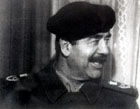Commentary/Mani Shankar Aiyar
Not one country has applauded the great courage and sincerity of purpose that the Americans are finding in themselves!

The justification for Clinton's offensive, and poddle Great Britain's
endorsement, is that Saddam needs to be taught a lesson (ahem,
amend that to read: one more lesson, never mind that he does not
seem to have learned any of the earlier ones) -- namely, that aggression
doesn't pay. If that leaves Saddam a somewhat confused pupil,
it is because the punishment he has been subjected to is for a
crime he did not, in the first place, commit.
Saddam merely occupied
the Kurdish redoubt of Arbil (or Irbil/Erbil as the Americans
prefer to spell it). Now, Arbil is not in some foreign country.
It does not lie in Kuwait or Turkey or Jordan. We are not even
talking of Arbil, Montana, US of A. We are talking of a dusty
but indubitably Iraqi town which lies no farther north of Baghdad
than Roorkee is from Delhi; and not in some foreign land that
is forever Iraq but hundreds of miles within the internationally-recognised
frontiers of Iraq.
Moreover, Saddam did not move into Arbil of his own sour will.
He did not even go there to give the Kurds another thrashing.
He was invited to go there by his most deadly, sworn Kurd enemy,
Massoud Barzani, rightful heir to the Kurdish insurgency begun
more than half-a-century ago by his illustrious father, Mullah
Mustafa Brazani, the one citizen of Iraq who refused to be cowed
down by the Ba'athists.
Barzani Jr was annoyed that his main
Kurdish rival, Jalal Talabani, was steadily gaining control of
the Kurdish cause thanks to financial and military assistance
from Iran.
If the Iranian oppressor of Kurdistan could decisively assist
in upstart Kurdish faction against the veteran Kurdish faction
then, reasoned Barzani, why should he not get an equally long
spoon to sup with that other devil, the Iraqi oppressor of Kurdistan?
And Saddam, as befits a patriotic Iraqi dictator, agreed to come
to the rescue of a Kurd who was at least an Iraqi national against
another Iraqi Kurd who had turned to the satan in Teheran.
Nothing more serious to this, one would have thought, than, say,
Ram Vilas Paswan turning to Lakshmi Parvati to do down Laloo
Prasad Yadav. Yet, it has been casus belli enough for the president
of the United States to launch 44 missile attacks on Iraq (from
the South Pacific island of Guam, 14,000 miles --- half a world
--- away!) to compel the Iraqis to withdraw from their own territory.
And never mind that Saddam had already announced that by 4 September
he would be pulling his troops out of Arbil anyway -- since Talabani's
men had fled towards the Iranian border, the Barzani-Saddam mission
thus having been accomplished.
No wonder then that, poddle Great Britain apart, not one single
country has applauded the great courage and sincerity of purpose
that the Americans are finding in themselves. The two countries
most vulnerable to Saddam's excesses, Jordan and Turkey, have
done a double-take.
The Turkish prime minister, Necmettin Erbakan
(note for Indian readers; Necmettin is the Turkish spelling of
Najmuddin), has refused to make himself available to the US ambassador
in Ankara. Clinton's message of self-justification has, therefore,
had to be delivered to the deputy PM, Tansu Ciller, who has taken
the precaution of not endorsing the US action.
And Jordan's King Hussein has so pointedly refused to back the
Americans that the Americans are comforting themselves with the
thought that even if the chairman of the US chiefs of staff, the
incredibly-named General Shalikashvili, didn't get an 'Attaboy'
from His Majesty at least he (the general) 'did not
go away wringing his hands or shaking his head.' (The quote
is from the official briefing!) This, says the above quoted American
official, is because the US chief of staff had not come to Amman
to ask the King of Jordan --- but to tell him!
|





